Key takeaways:
- JavaScript frameworks like React, Angular, and Vue.js significantly improve productivity and code organization, allowing developers to create user-friendly applications more efficiently.
- Frameworks offer strong community support, providing valuable resources and solutions that enhance collaboration and skill growth among developers.
- Choosing the right framework involves considerations like project scalability, community engagement, and the learning curve, impacting both development experience and application performance.
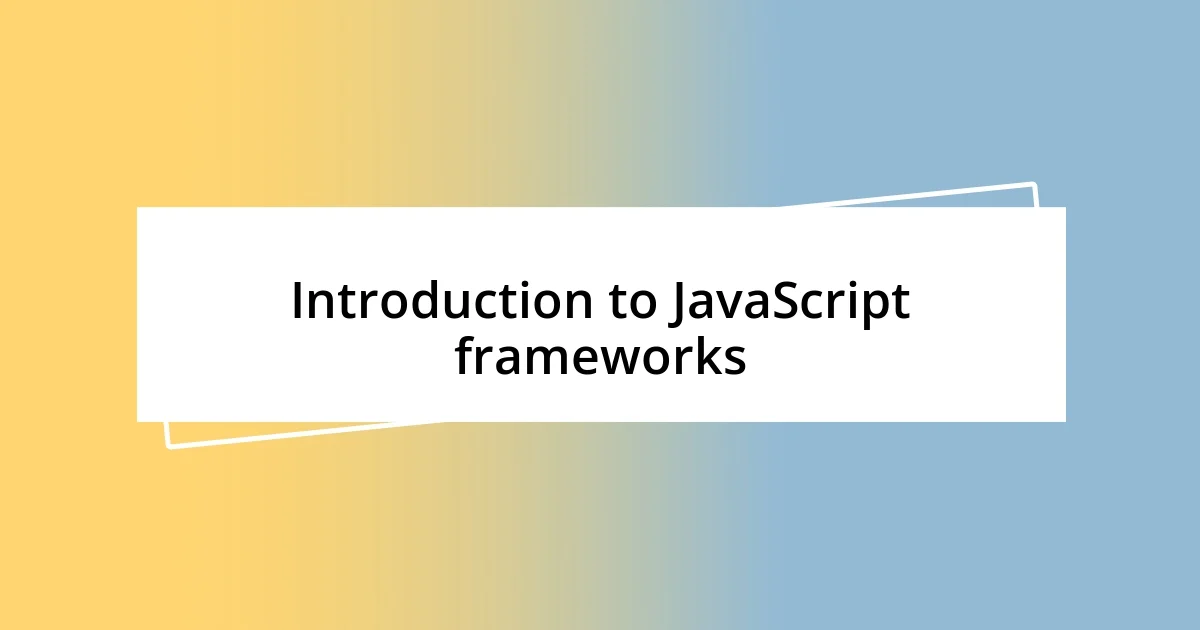
Introduction to JavaScript frameworks
JavaScript frameworks have revolutionized the way we develop web applications. I still remember the first time I dived into a framework— it was like stepping into a whole new world. The structured approach provided by frameworks like React and Angular made my code cleaner and more efficient, transforming my frustration into excitement.
What’s truly fascinating is how these frameworks streamline development processes. Have you ever felt overwhelmed by the sheer number of options available? I certainly did when I was starting out. Each framework offers unique features, helping developers tackle both simple and complex projects with ease. It was a game changer for me, allowing me to focus more on creating compelling user experiences rather than getting lost in the intricacies of JavaScript itself.
Additionally, the community support around these frameworks is extraordinary. I’ve often turned to forums or GitHub repositories after hitting a brick wall during my projects. It’s comforting to know that there’s a whole network of developers ready to share their insights and solutions. This sense of community not only enhances our skills but also fosters collaboration and growth in our craft.
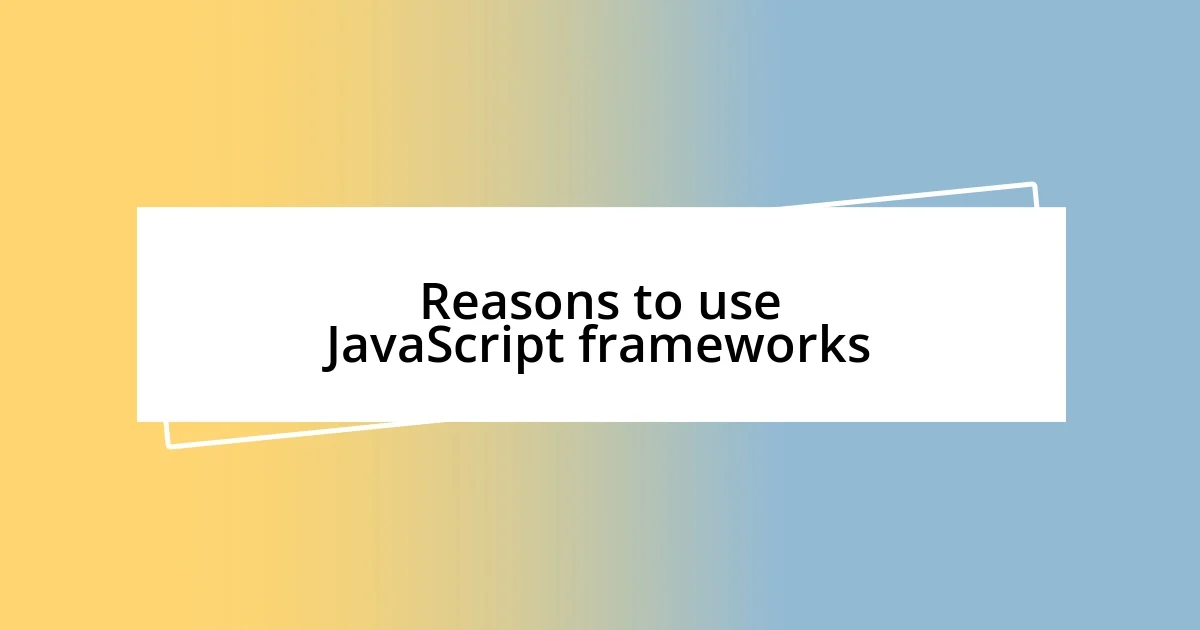
Reasons to use JavaScript frameworks
JavaScript frameworks are a developer’s best friend for boosting productivity. When I started using them, I found that the built-in tools and libraries helped me cut development time significantly. For instance, with React, I could create components that I reused throughout different projects, which reduced redundancy and made maintenance a breeze.
Another compelling reason to use JavaScript frameworks is their ability to enhance performance. I recall a project where I implemented Angular, and it provided seamless data binding and dependency injection. This not only made the application more responsive but also improved load times—a vital factor for user satisfaction. Those moments of delight when users appreciated the speed of the app felt rewarding!
Lastly, JavaScript frameworks support responsive design, which is crucial in today’s mobile-first world. I remember struggling with layout issues before using frameworks. However, with frameworks like Vue.js, I could easily create responsive components that looked great on any device. It was almost like a weight had been lifted off my shoulders, enabling me to deliver polished, user-friendly applications effortlessly.
| Reason | Benefit |
|---|---|
| Boosts Productivity | Reduces development time with reusable components |
| Enhances Performance | Improves load times and responsiveness |
| Supports Responsive Design | Facilitates easy adaptation for all devices |
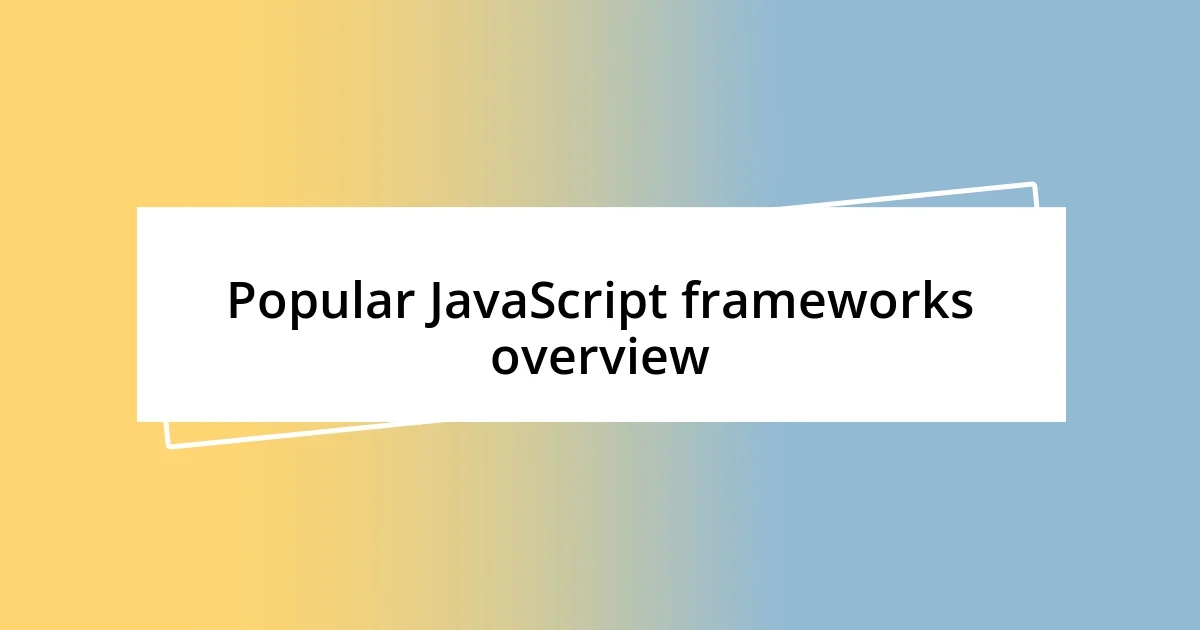
Popular JavaScript frameworks overview
The world of JavaScript frameworks is teeming with options, each designed to cater to various needs and preferences. I remember my first encounter with Vue.js; its simplicity and gentle learning curve made the initial stages of my development journey feel like a breeze. Every framework has its personality, and while React flaunts its component-based structure, Angular operates with a more opinionated approach that can feel rewarding but also challenging at times. The array of features offered often reflects the community that champions them, highlighting the importance of choosing a framework that resonates with your style of coding.
Here are some of the most popular JavaScript frameworks, along with a brief description of what makes them stand out:
- React: A library for building user interfaces, it’s component-driven and widely adopted for its flexibility and reusable components.
- Angular: A powerful framework that provides a comprehensive solution with built-in tools for building enterprise-level applications.
- Vue.js: Known for its approachable nature, Vue.js allows developers to adopt its features incrementally, making it friendly for newcomers.
- Svelte: An innovative framework that shifts a lot of work to compile time, offering enhanced performance and simplicity by eliminating the virtual DOM.
- Next.js: A framework built on top of React that enriches server-side rendering (SSR) capabilities, making it a go-to for building performant, SEO-friendly applications.
Each framework has been a stepping stone in my journey, and exploring them has given me a better understanding of web development’s vast landscape. It’s exciting to see how they shape our coding practices and the user experiences we deliver.
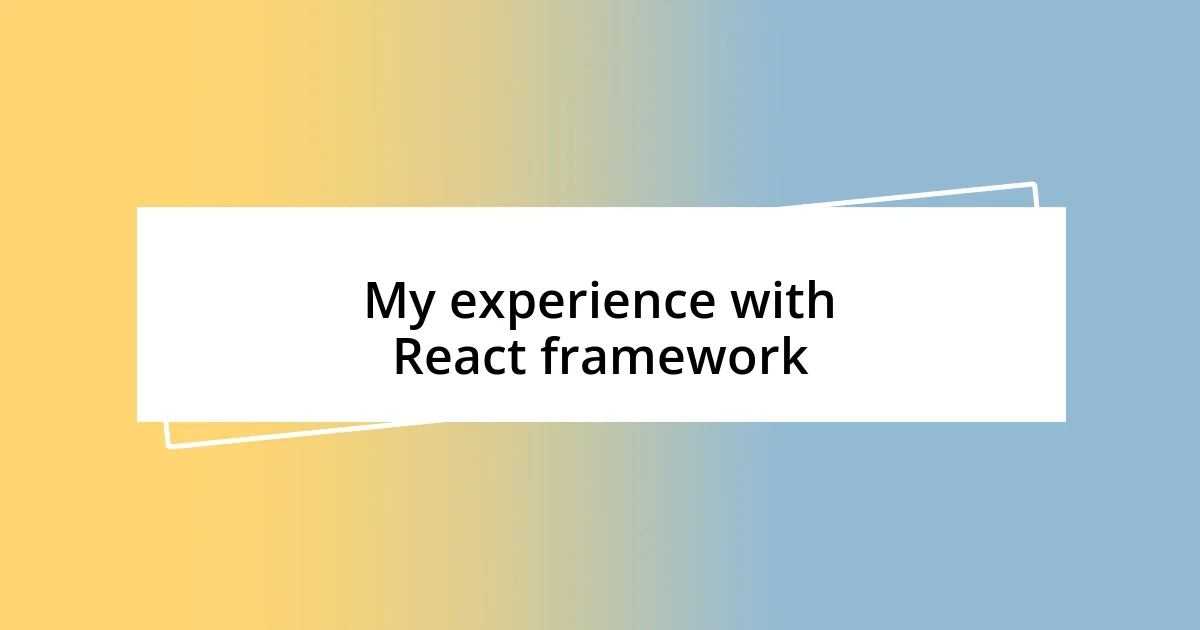
My experience with React framework
React has truly transformed the way I approach web development. I remember the first project where I integrated React—I was blown away by how quickly I could create interconnected components. This not only saved me time but also made my code cleaner and easier to manage. Have you ever experienced that satisfaction of seeing your code work seamlessly together? It’s a game-changer.
As I delved deeper into React, the concept of state management became a pivotal part of my learning journey. Initially, I found it a bit intimidating, especially when implementing useState and useEffect hooks. However, overcoming that challenge felt incredibly rewarding. The moment I saw my frontend update in real-time based on user input was exhilarating! It was like the application came to life, and I was thrilled to create more dynamic experiences for users.
I’ve also come to appreciate the vibrant community surrounding React. The plethora of resources, libraries, and tools that fellow developers share has enriched my experience significantly. When I hit a roadblock, someone out there has usually crafted a solution or a helpful article. It’s amazing how collaboration can spark innovation. Have you ever felt like you were part of something larger, where the collective knowledge just elevates your work? That feeling has been a constant source of inspiration for me while navigating the React landscape.
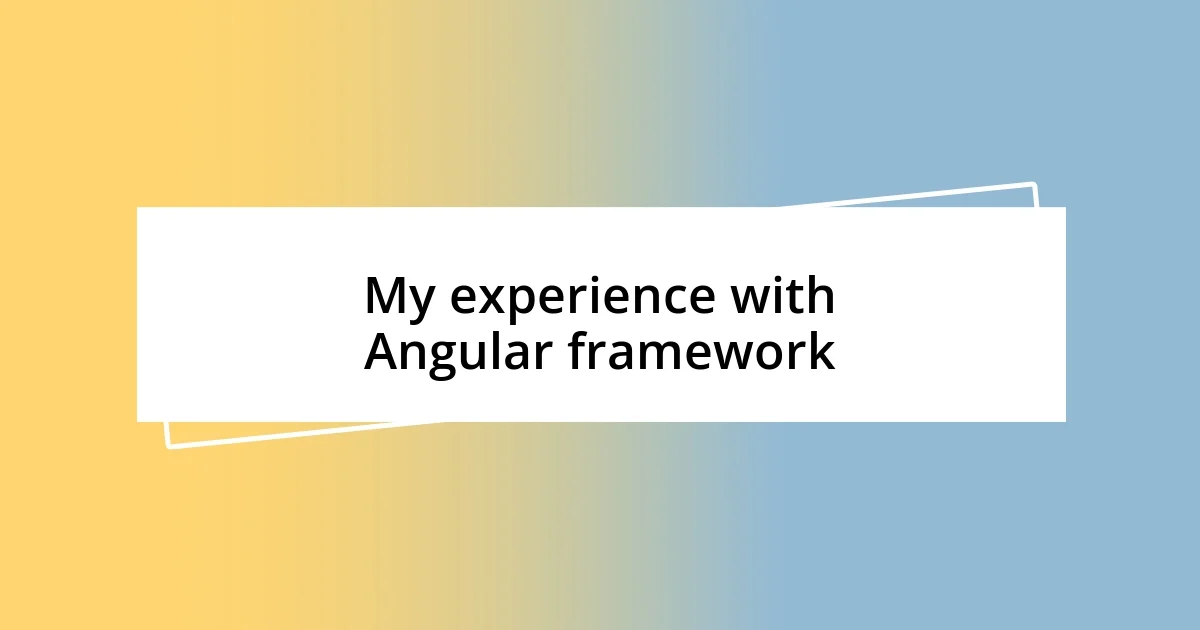
My experience with Angular framework
My journey with the Angular framework has been quite an adventure. The first time I dove into Angular was during a project for a client who wanted a robust enterprise solution. I remember feeling a mix of excitement and trepidation as I navigated its intricate structure. The two-way data binding feature was a revelation! Have you ever experienced the joy of seeing changes in your model instantly reflected in the view? It’s an exhilarating prompt that makes development feel almost magical.
One of the aspects I truly appreciate about Angular is its powerful CLI. When I first used it to create components and services, I was impressed by how it streamlined my workflow. I vividly recall a late night when I had to implement routing. With a few simple commands, I was able to set up navigation without breaking a sweat. That feeling of efficiency reminded me why I enjoy coding—solving complex problems with elegant solutions.
However, I won’t shy away from the challenges Angular presented. The steep learning curve can be daunting, especially when it comes to mastering RxJS for reactive programming. I still remember puzzling through observables and being overwhelmed at first. But once I grasped their power, the satisfaction of handling asynchronous data became addictive. Have you ever had that moment when everything clicks, and you realize you’ve just leveled up your skills? That’s exactly how I felt when I got the hang of managing data streams in my applications.

My experience with Vue framework

My experience with Vue framework
Diving into Vue was a breath of fresh air for me. I still remember my first encounter with its simplicity; building my first small application felt like assembling a puzzle that just clicked together perfectly. Have you ever felt that sense of clarity when you finally understand a new tool? It’s that gratifying moment when everything just makes sense, and you can see the potential that lies ahead.
As I grew more comfortable navigating the Vue ecosystem, its reactive data-binding feature stood out. I enjoyed observing how changes in the model would instantly reflect in the view—it was like magic happening in real-time! One late evening, while experimenting with Vue components, I implemented a feature that allowed users to filter data on-the-fly. The rush I felt when I saw it working was something I’ll always cherish; it was as if I was crafting a living, breathing application rather than just writing code.
What truly makes Vue special for me is its supportive community. It’s comforting to know that when I’m grappling with a new challenge, there are countless resources and passionate developers willing to share their expertise. I vividly recall a time I was stuck trying to understand Vue Router for navigation. I turned to online forums, found valuable advice, and ultimately managed to implement a smooth routing solution. Have you ever felt that wave of relief when you finally overcome a hurdle? That’s precisely how supportive communities elevate our craft—helping each of us to grow as developers, one shared insight at a time.

Tips for choosing a framework
When choosing a JavaScript framework, it’s essential to consider your project’s specific needs. Reflecting on my experiences, I always think about scalability. For instance, during a project with increasing user traffic, I realized that the framework I selected needed to handle the load gracefully. How can a framework help ensure that your application remains performant as it grows? This is a critical question to ask, as it directly impacts user experience.
Another vital factor is community support. I remember feeling overwhelmed when I encountered a bug in a framework I was using. That moment of panic turned into relief when I discovered a vibrant community ready to lend a hand. Have you ever found solace in a forum, where developers share their insights? A framework with an active community can often mean quicker resolutions to your issues and insights that aren’t found in documentation.
Lastly, consider the learning curve associated with the framework. In my early days, I chose a framework steeped in complexity, and it nearly derailed my enthusiasm for development. I often reflect on how it felt to be lost in a sea of documentation. I learned the hard way that a steeper learning curve isn’t always the best choice for everyone. Think about your current skill level and how much time you’re willing to invest in mastering a new tool—it can make all the difference in your overall experience.












